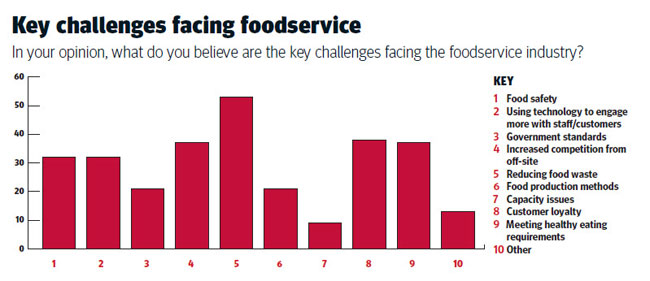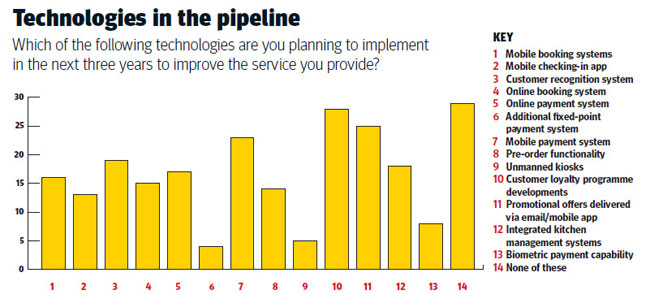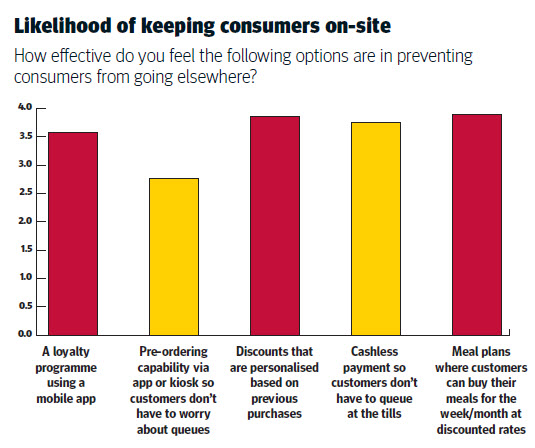Technology: Caterers look for the single solution
Caterers may have embraced technologies for booking or stock control, but there's a host of other areas, such as food waste, loyalty programmes and mobile payments, that should be integrated into one simple technology, according to new research undertaken by The Caterer. Elly Earls reports
Caterers are keen to embrace new forms of technology to boost efficiency, improve customer service and alleviate the challenges they face, but they don't know which technologies they should be looking at, according to new research carried out by The Caterer in partnership with cloud-based technology provider Omnico.
Of the caterers surveyed, 53% believe that reducing food wastage is a key challenge facing the foodservice industry, and 54% wish technology could help by predicting the quantities of food their customers require. These are two of the findings from the research, which surveyed 153 people in the contract catering and foodservice industry on their current use of technology and future ambitions
to improve their customer engagement and revenue through new technology.
Meanwhile, 33% said they wished technology could give their customers the ability to pre-book, so orders and numbers could be more accurately predicted, and 52% believed this would improve operational efficiencies.
According to Omnico chief executive Mel Taylor, they're right: "A single system or a sole piece of technology won't solve the issue overnight, but we have seen from the various brands we work with that via a joined-up, seamless platform that ties together all the bookings, table reservations, entitlements, loyalty cards and so on, caterers can paint a 360-degree picture of their customers. This allows them to more accurately predict food types and numbers of people to cater for, and even fine-tune it to the exact meals or items people would like," he says.
This isn't the only way technology is helping forward-thinking caterers address food waste.
Grazing Catering, for example, supplies each of its sites with a tablet and a comprehensive wastage and stock ordering form to complete after lunch service every day. This information is then fed back to the company's HQ and kitchen in real time so the team can constantly adjust production quantities and minimise
wastage on a day-by-day basis.
"With real-time data flowing between each of our sites and our head office, we don't have to wait until the end of each week or month to detect patterns after wastage has already occurred," explains chief executive Sam Hurst.
Compass Group UK & Ireland uses waste management company Winnow's smart scales, which let kitchen staff log what food is thrown away to help predict and manage the company's food needs and cut down waste without any negative impact on the guest experience.
"We've seen average food waste reductions in the range of 50%," says Duncan Gray, head of corporate responsibility at Compass, which has been working with Winnow for the past three years. "Our kitchen baseline waste production was already below industry averages, which shows just how powerful having accurate data is to changing behaviour."
How to inspire loyalty
For Taylor, one of the most surprising findings to come out of the research was the low percentage of companies that had implemented loyalty programmes (36%) or promotional offers delivered by email or mobile app (30%). "This suggests that many companies are behind the curve when it comes to customer engagement," he says.
That said, it is also clearly an area that caterers know they need to address, with 28% planning to implement customer loyalty programme developments in the next three years and 25% promotional offers delivered by email or mobile app. Moreover, 48% of respondents would like to use technology to offer personalised discounts based on previous purchases and 41% a loyalty programme via a mobile app.
Levy Restaurants UK's already popular CFC Express app, which allows Chelsea Football Club fans to pre-order their food and beverages ahead of and during match days, is a case in point. "The app has received amazing customer feedback and the team now has plans to develop it so it provides the business with relevant information to deliver a more personalised service," says Navjeet Daine, head of concessions at Chelsea FC, Levy Restaurants UK.
Taylor is also keen to emphasise that when implementing a loyalty programme, operators must ensure it is plugged into every sales channel and touch point. "This will ensure a frictionless experience, building and encouraging customer engagement and spend," he says. "Whether purchases are made via mobile app, online booking system, card or kiosk, the loyalty engine must be cohesive across
each to make the experience simple.
"No one wants to carry multiple branded loyalty cards or try and find a login membership number each time; they want to scan or swipe their mobile device quickly and easily. They also want to receive their points or rewards in real time and be able to check their balance and ‘spend' their points however they choose, all of which are done simply with an integrated point of sale and customer engagement engine."
The convenience of mobile payments
It's no secret that convenience is king for today's consumers, so it came as little surprise to Taylor that online booking and payment systems are already relatively commonplace across the foodservice industry, with 40% having implemented online booking systems and 30% using them specifically to improve customer service. "It's what consumers now come to expect from every brand," he says.
"Those caterers who don't look to provide these options will become left behind." Yet it's mobile that's set to become the key platform for the future, something that not only comes through in this piece of research, with 23% of caterers planning to implement mobile payment systems in the next three years, but also in other surveys carried out by Omnico.
"We have conducted extensive research focused on retail and theme park markets, and mobile continuously comes back as the number one platform for consumers today," Taylor says.
"For instance, 74% of UK consumers want a quick and convenient shopping experience. In addition, 41% in our Retail Gap Barometer research said they chose mobile payment options because they don't have to face long queues. For caterers, queueing is a fundamental issue and simply allowing consumers to scan products with their mobile device and swiping it at the till-point to pay can negate this issue entirely."
Respondents clearly agree, with 41% wanting to use cashless payments to reduce queues at the tills and prevent customers from going elsewhere, and 44% believing that the ability to pay without cash using a loyalty card or mobile app will improve canteen or food outlet footfall. And 43% even go as far as saying that through engagement via a mobile app, they believe they could boost revenues by 10%-20%.
Bartlett Mitchell has the stats to back this up. "Mobile is a fundamental part of our sales and growth strategy. This year, we increased sales at participating client sites by more than 20% through the use of digital apps," says Lin Dickens, marketing director at Bartlett Mitchell.
"The apps, which include pre-order, loyalty reward and feedback-based platforms, have enabled us to enhance our site-based sales activity and drive additional revenue into client locations.
"We have been able to enhance the customer experience by reducing queues as well as remove printing costs for loyalty cards, supporting our CSER initiatives. It has also provided us with the opportunity to use beacon technology to target customers and provide them with offers directly relevant to them. It has been a game-changer for us."
The future: omni-channel catering
The ultimate goal for caterers is to provide a seamless, frictionless customer journey, with 38% of respondents saying they wished technology could help them have one integrated system connecting all bookings and till point systems Taylor's advice is to look to the retail and entertainment industries for inspiration.
"For several years now, retail brands have been embracing what is known as omnichannel retailing; the joining up of multiple customer touchpoints and sales channels, such as physical stores, online, mobile, apps and telephone sales, with the same brand experience across the interaction," he explains, adding that he sees a future where caterers will do the same.
"To get to that point they will need to evaluate the existing legacy systems they have and integrate a single underlying engine that can bring these together and therefore join up the customer experience across them. There is no need for caterers to rip and replace everything they currently use, there are simple ways in which new technology can be embraced. It's ensuring all these systems talk to each other and provide the same brand experience."
Get your staff up to speed
Staffing, staff training and retention were cited as key challenges by survey respondents, and there are numerous ways technology can help. First, by choosing a system that provides a single point of sale engine across all customer touchpoints, staff only have to be trained once on a system, no matter where in
the business they are using it.
"This industry doesn't want to get left behind in terms of innovation, and the more tools operators can provide staff with, the more they will retain their staff," Omnico's Mel Taylor says.
Technologies developed specifically to improve employee engagement have also proven invaluable at Foodbuy, part of Compass Group UK & Ireland.
For example, ‘Workplace', an internal digital platform created by Facebook, encourages employee engagement on both a one-toone and a one-to-many basis.
"We have started with our 6,000-strong office population and found that the ability to create communities, share factual information, business updates,
celebrate success and achievements, as well as share best practices and collaborate is invaluable," says the company's strategic sourcing lead Dan Perfect.
"We are now looking to roll it out to our frontline colleagues, which would be transformational for the business."
Technology can also support a multitude of HR functions, including recruitment, according to Bartlett Mitchell's Lin Dickens. "If people apply for a role and we don't have a position available, their application and CV are held on our portal and relevant comms are sent to them to keep them ‘warm'. The portal also helps to schedule interviews with our business managers," she explains, adding that Bartlett Mitchell also uses technology to support training.
"All employees have an online personal employment portal, which shows their pay and benefits package, allows them to manage their holidays and see the training modules they have and can do. There is no paper involved."
Finally, there are a number of ways technology can help improve the efficiency of employees' day-todaylives. For example, Grazing Catering uses RotaCloud to deliver staff rotas to every team member's smartphone, enabling them to sign
in and out of their shifts at the click of a button and ensuring they are paid accurately and never have to query their timesheets or pay.
"We also use PeopleHR to seamlessly connect with RotaCloud and allow staff to book holidays and time off using their smartphone, send and receive messages from their team, access and view company handbooks and policies 24/7. This gives them fast, hassle-free access to things that would have taken quite a while to process in the past," Hurst adds.
In association with Omnico
Save
Save














